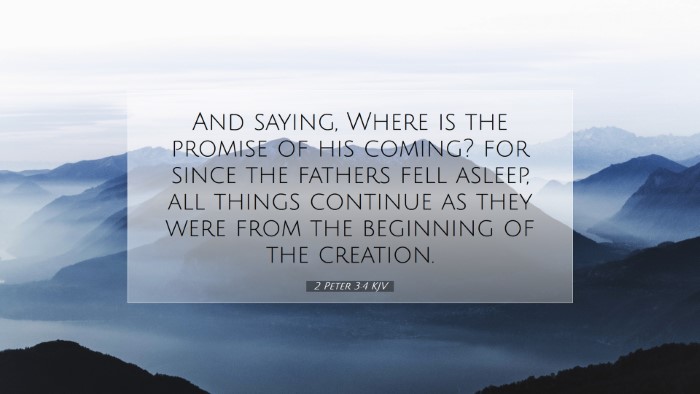Old Testament
Genesis Exodus Leviticus Numbers Deuteronomy Joshua Judges Ruth 1 Samuel 2 Samuel 1 Kings 2 Kings 1 Chronicles 2 Chronicles Ezra Nehemiah Esther Job Psalms Proverbs Ecclesiastes Song of Solomon Isaiah Jeremiah Lamentations Ezekiel Daniel Hosea Joel Amos Obadiah Jonah Micah Nahum Habakkuk Zephaniah Haggai Zechariah Malachi2 Peter 3:4
2 Peter 3:4 KJV
And saying, Where is the promise of his coming? for since the fathers fell asleep, all things continue as they were from the beginning of the creation.
2 Peter 3:4 Bible Commentary
Commentary on 2 Peter 3:4
Verse: “And saying, Where is the promise of his coming? for since the fathers fell asleep, all things continue as they were from the beginning of the creation.”
Introduction
The verse under consideration reflects the underlying skepticism that characterized the early church as it anticipated the Second Coming of Christ. Through this commentary, we shall explore the significance of the phrase “Where is the promise of his coming?” and its implications for believers, while drawing insights from notable public domain commentaries.
Contextual Background
This epistle by Peter stands as a response to false teachers and those who questioned the validity of Christ’s return. The verse, 2 Peter 3:4, denotes a growing disbelief among some believers who challenge the teachings of Christ’s imminent return.
Verse Analysis
1. Skepticism about Divine Promises:
Peter addresses a common viewpoint of the early church, where certain individuals posed the rhetorical question of Christ’s return, questioning God’s faithfulness to His promises.
- Matthew Henry: Highlights that the inquiry reflects the mockery of those who lost sight of God’s timing and assurance. They illustrate a worldly logic that dismisses spiritual realities.
- Albert Barnes: Notes that this skepticism arises from the natural state of human observation; they see daily life continuing without interruption and thus dismiss prophetic pronouncements.
- Adam Clarke: Points out the incredulity expressed in the question, indicating an expectation of immediate fulfillment which leads the skeptics to doubt God’s promise entirely.
2. The Historical Context:
The reference to “since the fathers fell asleep” suggests a historical perspective, drawing on the experiences and deaths of prior generations of believers, indicating that if Jesus had not returned by now, perhaps He never would.
- Matthew Henry: Emphasizes the danger of equating God’s patience with indifference. Just because the fathers in faith have died does not negate the promise of Christ.
- Albert Barnes: Argues that the continuity of the seasons and circumstances may lead to erroneous conclusions about divine intervention, yet highlights the need for a deeper spiritual insight.
- Adam Clarke: Discusses how this statement reflects a misconception of the nature of divine time, contrasting human perceptions with God's eternal wisdom.
Theological Implications
Within this verse lies profound theological significance concerning faith, eschatology, and the nature of God's promises. The questions raised evoke reflections on the nature of hope and the role of patience in the life of a believer.
1. The Assurance of Christ's Return:
Peter provides a foundation for believers to remain steadfast in hope despite apparent delays or challenges to their faith.
- Matthew Henry: Urges believers to find comfort in the understanding that God’s timing is not only perfect but reflects His sovereignty and ultimate plan.
- Albert Barnes: Encourages a firm belief in the promise of Christ’s return and warns against allowing worldly logic to shape one's faith.
- Adam Clarke: Advocates for a resolute faith, reminding believers that Christ’s coming is as certain as His first advent.
2. The Call to Remain Vigilant:
This verse serves as a reminder for the church to maintain diligence and awareness as they await the fulfillment of God's promises.
- Matthew Henry: Stresses the importance of living out one's faith in expectation of Christ's return, thereby fostering moral responsibility and faithful service.
- Albert Barnes: Points out the necessity of encouraging one another in the faith and maintaining a collective watchfulness.
- Adam Clarke: Concludes with a reminder that faith is not passive; rather, it calls for active anticipation coupled with righteous living.
Practical Applications for Believers
The contemplations of 2 Peter 3:4 carry profound implications for contemporary believers. Understanding the historical context and theological significance calls for practical outworking in the lives of those who hold to the faith.
- Living in Hope: Believers are invited to cultivate a hopeful heart that holds firmly to the promises of Christ, even amidst trials and apparent delays.
- Engaging with Skepticism: They should be prepared to engage with and respond to the skepticism surrounding the faith, demonstrating both the reasonableness and the depth of their beliefs.
- Encouragement in Community: The body of Christ is called to support one another, fostering a climate of encouragement that points back to the assurance of Christ’s return.
Conclusion
2 Peter 3:4 challenges believers to embody a faith that transcends doubt and skepticism. Amidst the voices that question God's promises, the apostolic reminder of Christ's return serves to strengthen, encourage, and galvanize the church. Such insights from historical commentaries enlighten our understanding and equip us to walk steadfastly in faith, reflecting a life of expectant hope in the face of uncertainty.


